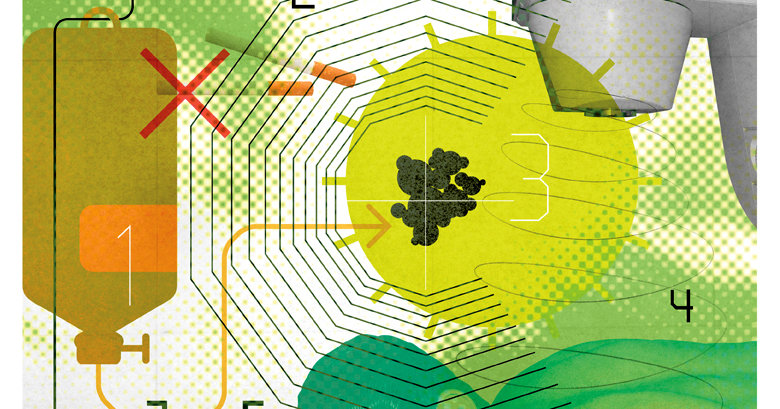
First thing Monday morning my patient, a man in his early 60s, showed up to start chemotherapy. It had not been a smooth road for him over the past few months.
He had myelodysplastic syndromes, a cancer of the bone marrow that impairs the production of red and white blood cells and platelets, to varying degrees. In its milder forms, one of my patients referred to the illness, known as MDS, as “mild displeasure syndrome”: he didn’t like having to fight the Cleveland traffic for clinic visits every three months to check his blood counts, but otherwise it didn’t impact his quality of life.
But as MDS becomes more advanced, the blood counts worsen, leading to a dependence on routine transfusions, life-threatening infections as the immune system is crippled, and possible transformation to acute leukemia. We initiate chemotherapy to try to prevent that from happening.
In the early years of his illness, the mild displeasure syndrome phase, my patient and I had discussed likelihoods of progression and available drugs as if they were abstract concepts for a future, sicker him. He had shown up to the E.R. or been admitted to the hospital a few times with fevers, and each of those episodes represented a red flag of MDS that was getting restless, that had undergone some insidious change that needed to be lassoed, caged and somehow contained. A bone marrow biopsy confirmed that we were now facing a different disease, one necessitating more aggressive treatment.
The previous week, I saw my patient in clinic to discuss the biopsy results and the need to start chemotherapy. His face was serious behind his steel-rimmed glasses, his lips pursed. But he conceded the truth of what was occurring in his body.
“Years ago I asked you what we were going to do about this MDS, and you said: ‘Nothing. Go enjoy your life.’ And that’s what my wife and I did. We traveled, saw the world, and I did enjoy my life. I had a great life, until the past few months.”
He sighed and chuckled, as if laughing at his own folly. “I guess I thought I would go forever with the MDS staying the same.” Then he shook his head. “Nah, I always knew better. I knew it would come to this.” It was like watching a gentler Gollum, from J.R.R. Tolkien’s “The Hobbit” and “Lord of the Rings,” in a tortured debate with himself: denial vs. insight; fantasy vs. reality.
We discussed the goals of therapy and side effects of the treatment, and set a start date of Monday. He seemed resolved.
But he called my office the day after that discussion to review the conversation. “I don’t remember a thing we talked about,” he told me.
He called again with a question about the schedule.
When Monday arrived, he looked haggard.
“I didn’t sleep last night. Doc, I’m not ready to start the chemo. My head just isn’t there. But I’m worried I’m disappointing you, that you’ll think less of me if I don’t start today.” He shook his head. “I’m being so stupid.” The self-castigating Gollum had returned.
“You’re not,” I reassured him. “What you’ve done is brave, and I have so much more respect for you for being honest and in touch with where you are psychologically.”
“But am I hurting my chances by delaying the therapy a couple of weeks?” he asked.
I shook my head. “In my experience, people who start therapy before they’re ready are more likely to experience side effects and to not complete their therapy, or to get treated haphazardly. It’s better if you start the treatment when you can jump in wholeheartedly, and without regrets.”
His whole body seemed to relax. But then, worry again. “Am I hurting someone else by not keeping my chemo appointment? By taking their appointment times? Am I wasting chemo that another patient could use?”
My heart melted. In the midst of his angst, he jumped to the plight of others. I told him his decision wouldn’t have an impact on anyone else.
We consider the biology and behavior of cancer when determining the best time to start treatment. Psychology and preparedness is just as important.
“What are you going to do for the next couple of weeks?” I asked him.
“I’m going to go down to Myrtle Beach and sit in a chair by the ocean. And I’m going to spend the next two weeks staring at the ocean, and thinking about where we all came from. And when I come back, I’ll be ready for the chemo.”
So would I.

